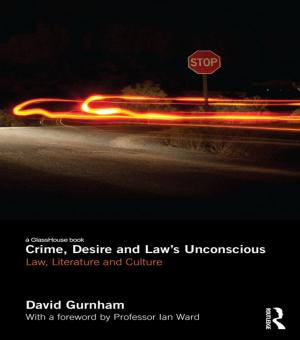Wild/lives
Trickster, Place and Liminality on Screen
Nonfiction, Health & Well Being, Psychology, Mental Health, Social & Cultural Studies, Social Science| Author: | Terrie Waddell | ISBN: | 9781317724032 |
| Publisher: | Taylor and Francis | Publication: | February 25, 2014 |
| Imprint: | Routledge | Language: | English |
| Author: | Terrie Waddell |
| ISBN: | 9781317724032 |
| Publisher: | Taylor and Francis |
| Publication: | February 25, 2014 |
| Imprint: | Routledge |
| Language: | English |
Wild/lives draws on myth, popular culture and analytical psychology to trace the machinations of 'trickster' in contemporary film and television. This archetypal energy traditionally gravitates toward liminal spaces – physical locations and shifting states of mind. By focusing on productions set in remote or isolated spaces, Terrie Waddell explores how key trickster-infused sites of transition reflect the psychological fragility of their willing and unwilling occupants. In differing ways, the selected texts – Deadwood, Grizzly Man, Lost, Solaris, The Biggest Loser, Amores Perros and Repulsion – all play with inner and outer marginality.
As this study demonstrates, the dramatic potential of transition is not always geared toward resolution. Prolonging the anxiety of change is an increasingly popular option. Trickster moves within this wildness and instability to agitate a form of dialogue between conscious and unconscious processes.
Waddell's imaginative interpretation of screen material and her original positioning of trickster will inspire students of media, cinema, gender and Jungian studies, as well as academics with an interest in the application of Post-Jungian ideas to screen culture.
Wild/lives draws on myth, popular culture and analytical psychology to trace the machinations of 'trickster' in contemporary film and television. This archetypal energy traditionally gravitates toward liminal spaces – physical locations and shifting states of mind. By focusing on productions set in remote or isolated spaces, Terrie Waddell explores how key trickster-infused sites of transition reflect the psychological fragility of their willing and unwilling occupants. In differing ways, the selected texts – Deadwood, Grizzly Man, Lost, Solaris, The Biggest Loser, Amores Perros and Repulsion – all play with inner and outer marginality.
As this study demonstrates, the dramatic potential of transition is not always geared toward resolution. Prolonging the anxiety of change is an increasingly popular option. Trickster moves within this wildness and instability to agitate a form of dialogue between conscious and unconscious processes.
Waddell's imaginative interpretation of screen material and her original positioning of trickster will inspire students of media, cinema, gender and Jungian studies, as well as academics with an interest in the application of Post-Jungian ideas to screen culture.















